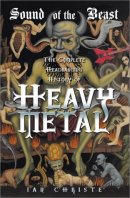
Sound of the Beast
Ian Christe
386 pages, including notes and index
published in 2003
I discovered 'eavy metal the way you're supposed to, in high school, by getting tapes from slightly older and more worldy classmates. 'Maiden, Anthrax, S.O.D. and M.O.D., Helloween, and laer Slayer, Sepultura, Biohazard and Judss Priest were the bands that got me through high school. At that time, at that place, metal was cool.
Something that in the real world, it really never has been. Metal has had the worst of both worlds: neither critical acclaim nor street cred. Metal is adolescent powerfantasy music for white suburban boys. It's hopelessly naff, with no redeeming features and actually quite antisocial, with all its talk about Satan and death and war and shit.
Even now, with the socalled metal revival, it's more a case of the intelligentsia ironically embracing the naffness of metal rather than a honest appreciation of the genre. Case in point: The Darkness, whose whole formula is based on being as corny as possible...
This is not a point of view I have much truck with and fortunately, nor does Ian Christe. Sound of the Beast is an entertaining history of 'eavy metal in all its forms, from the Origin of all Metal (Sabbath) to today. For those who already like metal it's a feast of recognition, while for those unfamiliar with it it's a good starting point.
As said, Christe starts off with Black Sabbath, who in 1969/70 basically invented heavy metal, then burns quickly through seventies hardrock and the New wave of British Heavy Metal, which started just after punk rock broke through and in part stems from the same source. The prelude done, Christe then comes to the story he really wants to tell, the rise of American meetal in the eighties and early nineties and the role Metallica played in making metal big.
This is the core of the book, with the remainder feeling slightly perfunctionary. Christe benfits from having been heavily involved himself in the US metal scene and he tells its story with an enthusiasm the rest of the books lacks somewhat. Not that these chapters are bad, they just lack the same involvement Christe had with the core of the book. He covers all the bases and in the end you do have a good general overview of the history of metal. Christe is certainly inclusive; even "Nu Metal" wannabes like Linkin Park are covered.
I like this view of metal, as an inclusive, constantly evolving musical genre, which gets along well with other forms of music, like rap or punk. Metal is too often thought of as deeply conservative, outdated music for long haired geezers, when in fact it has been adapting itself continuesly.
The thing is, after a relatively brief period in the late eighties and early nineties when true metal, rather than "hair metal", was actually popular and played on MTV, metal has been an underground music. It formed itself around d.i.y. bands and independent record labels and supports itself by doing tours and selling albums rather than singles. Much of it has never and will never fit on pop music radio or tv, yet it is still incredibly popular with a wide range of people.
That is the important point Sound of the Beast makes and for that I forgive christe a certain slackness in looking at non-american metal.
